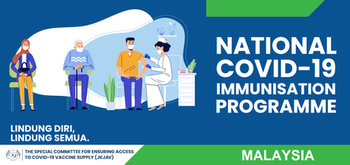 The immunisation programme is among the initiatives by the Malaysian Government to curb the spread of COVID-19 infections in the country | |
| Date | 24 February 2021 –10 January 2022 |
|---|---|
| Location | |
| Theme | "Lindung Diri, Lindung Semua" |
| Cause | COVID-19 pandemic in Malaysia |
| Target | To be fully protected against COVID-19 and transit the country from pandemic to endemic stage |
| Organised by | Ministry of Health and the Special Committee for Ensuring Access to COVID-19 Vaccine Supply (JKJAV) |
| Participants |
|
| Outcome |
|
| Website | KKMNOW |
| Part of a series on the |
| COVID-19 pandemic |
|---|
 |
|
|
|
The National COVID-19 Immunisation Programme (Malay: Program Imunisasi COVID-19 Kebangsaan), abbreviated as NIP or PICK, was a national vaccination campaign implemented by the Malaysian government to curb the spread of coronavirus disease 2019 (COVID-19) and to end the COVID-19 pandemic in Malaysia by achieving the highest possible immunisation rate among its citizens and non-citizens residing in the country.[1] It was the largest immunisation programme in the history of Malaysia and was administered by the Special Committee for Ensuring Access to COVID-19 Vaccine Supply (JKJAV) starting in early 2021.
Despite running smoothly for the most part, the programme faced numerous controversies and issues. These included a slow vaccine rollout due to a lack of vaccine supplies, despite the Malaysian government having purchased more than enough for the population. There were also concerns about poor prioritization of vaccine recipients, logistical problems with the MySejahtera's digital vaccination appointment and certificate system, misinformation about vaccines, outbreaks, overcrowding at vaccination centres, and reports of poor treatment of foreign workers by volunteers and authorities.[2][3][4][5][6][7] Videos of recipients receiving empty shots also surfaced, which the government attributed to human error caused by the fatigue of vaccinators.[8][9] Additionally, there were unverified rumours of vaccine spots being sold by volunteers.
A whole-of-government and whole-of-society approach was adopted to assist the programme, involving several ministries and government agencies, state governments, non-governmental organisations (NGOs), the private sector, and members of the community to ensure that the programme achieved its target. Khairy Jamaluddin, who was also Malaysia's Science, Technology and Innovation Minister (MOSTI), was appointed as the Coordinating Minister for the National COVID-19 Immunisation Programme after being approved by the Malaysian Cabinet. He served in this role until his resignation on 16 August 2021.[10][11]
The immunisation programme was implemented in phases from 24 February 2021 to February 2022, starting with Phase 1, which targeted healthcare workers and frontliners. Then Prime Minister Muhyiddin Yassin became the first individual in Malaysia to receive the Pfizer–BioNTech COVID-19 vaccine, in a broadcast that was aired live nationwide. As of the third week of September 2021, Malaysia averaged about 244,588 doses administered each day. At that rate, it was estimated that it would take an additional 27 days to administer enough doses for another 10% of the population.[12]
Vaccines administered per pharmaceutical company as of 16 June 2021
Total number of people who have received COVID-19 vaccinations in Malaysia as of 16 December 2021
According to the State of Mobile 2022 report, Malaysia's MySejahtera app ranked first in the world for install penetration rate and open rate among the Top COVID-19 Apps by Downloads Worldwide in 2021.[13]
- ^ Program Imunisasi COVID-19 Kebangsaan (PDF) (in Malay). Malaysia: Urusetia Jawatankuasa Khas Jaminan Akses Bekalan Vaksin COVID-19. 18 February 2021. p. 26. Archived from the original (PDF) on 18 February 2021. Retrieved 26 February 2021.
- ^ "Special Report: Why is Malaysia lagging behind in the vaccination rollout?". The Edge Markets. 6 May 2021. Archived from the original on 5 May 2021. Retrieved 29 August 2021.
- ^ Hibrahim, Muhammad Amnan (28 February 2021). "Vaksin: Kerajaan ambil serius, pantau isu potong barisan". Sinarharian (in Malay). Archived from the original on 28 February 2021. Retrieved 29 August 2021.
- ^ Rashid, Zainal AS (3 June 2021). "MySejahtera: Sesetengah pengguna mungkin mengalami kesulitan akses kerana trafik tinggi". BebasNews (in Malay). Archived from the original on 3 June 2021. Retrieved 29 August 2021.
- ^ Kamarudin, Hazelen Liana (26 February 2021). "Tindakan tegas sebar berita palsu vaksin Covid-19". Sinarharian (in Malay). Archived from the original on 27 February 2021. Retrieved 29 August 2021.
- ^ Daud, Ridauddin (13 July 2021). "204 petugas di PPV IDCC Shah Alam positif COVID-19". www.astroawani.com (in Malay). Archived from the original on 13 July 2021. Retrieved 29 August 2021.
- ^ Fadzil, Mohd Haris Fadli Mohd (29 July 2021). "PPV KLCC sesak: Pekerja asing dihantar tidak ikut janji temu". Sinarharian (in Malay). Archived from the original on 29 July 2021. Retrieved 29 August 2021.
- ^ "Bukit Aman say 13 reports so far on empty syringe vaccinations". The Star. Archived from the original on 22 September 2021. Retrieved 24 August 2021.
- ^ "Malaysia blames 'human error' after empty syringe used for Covid-19 shot". South China Morning Post. 23 July 2021. Archived from the original on 24 August 2021. Retrieved 24 August 2021.
- ^ Azman, Fareez (4 February 2021). "Khairy dilantik sebagai Menteri Penyelaras Program Imunisasi COVID-19 Kebangsaan - Muhyiddin" (in Malay). Astro Awani. Archived from the original on 5 February 2021. Retrieved 25 February 2021.
- ^ "The cabinet has resigned, says KJ". Free Malaysia Today. 16 August 2021. Archived from the original on 16 August 2021. Retrieved 16 August 2021.
- ^ "Malaysia: the latest coronavirus counts, charts and maps". graphics.reuters.com. Archived from the original on 16 August 2021. Retrieved 30 August 2021.
- ^ "State of Mobile 2022 - App Annie". App Annie. Archived from the original on 14 January 2022. Retrieved 14 January 2022.